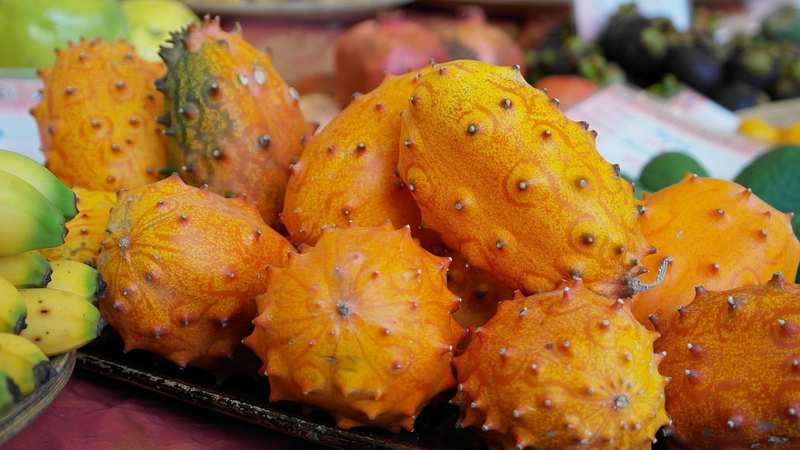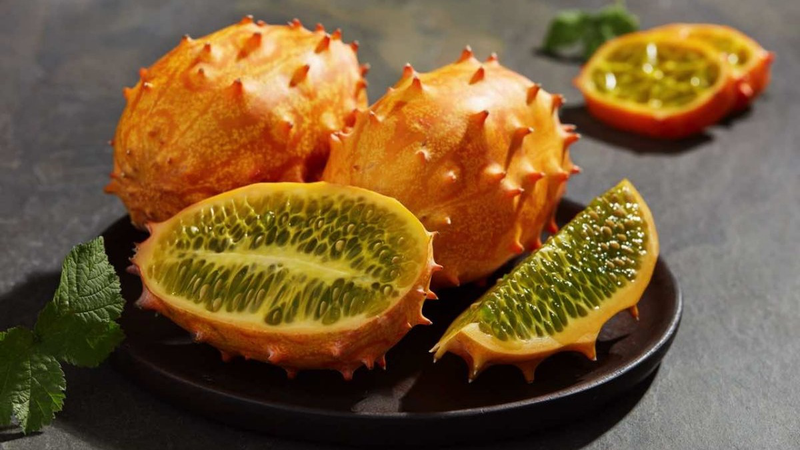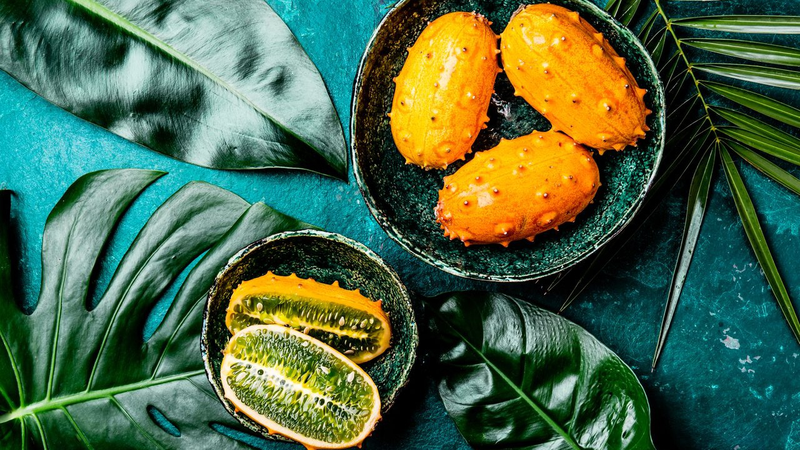The prickly cucumber, also known as the Kiwano horned melon, is a strange fruit with a unique shape and eye-catching color. Not only is it eye-catching, this fruit also contains many nutrients that are good for your health. The following article will help you discover the nutritional value of prickly cucumbers and the health benefits it brings to the body.
The prickly cucumber (Kiwano horned melon) has a bright orange outer skin with many strange sharp horns. a unique fruit with a strange shape and attractive flavor. Kiwano is known for its antibacterial, anti-ulcer and hypoglycemic properties and is a super healthy fruit.
Nutritional value of prickly cucumbers
Prickly cucumbers, also known as Kiwano horned melon or jelly melon, belong to the cucumber family. They are tropical fruits originating from Africa, Australia and some islands in the Pacific. The prickly cucumber is easily recognized by its orange-yellow outer skin and numerous sharp spines. When cut in half, the green flesh is jelly-like and filled with small seeds. Kiwano has a light, refreshing flavor reminiscent of a cross between banana and passion fruit.
Like its unique appearance, Kiwano horned melon offers a unique nutritional profile. The prickly cucumber is high in carbohydrates and low in calories. However, about 16% of its calories come from protein. One cup of prickly cucumber (about 233g) provides:
- Calories: 103Kcal;
- Fat: 2.94g;
- Sodium: 4.66mg;
- Carbohydrates: 17.6g;
- Sugar: 0g;
- Protein: 4.15g;
- Vitamin C: 12.3mg or 13.7% Daily Value (DV);
- Magnesium: 93.2mg or 22.2% DV;
- Iron: 2.63mg or 32.8% DV;
- Potassium: 287mg or 8.4% DV; Phosphorus: 86.2mg or 12.3% DV.

The prickly cucumber has a very distinctive appearance.
Surprising Health Benefits of Cucumbers
As a rich source of nutrients with many health benefits, what health benefits can cucumbers bring to us?
Improve immunity
A-tocopherol is an antioxidant in Kiwano that supports the body’s immune system and prevents blood clotting. It also protects cells from damage caused by free radicals and strengthens the immune system.
Prevents anemia
Cucumbers contain a fairly high amount of iron, which helps the body produce hemoglobin, a protein that carries oxygen in red blood cells. It also contributes to the production of myoglobin, a protein that supplies oxygen to the muscles. Kiwano contains non-heme iron, which is better absorbed when taken with Vitamin C, which is also present in this fruit.

Horned melon is rich in iron, good for people with anemia.
Good for the Skin
Vitamin C in Kiwano contributes to healthy skin by protecting it from sun damage and minimizing the effects of natural aging. It also aids in the healing of wounds and burns. Eating plenty of fruits and vegetables like cucumbers can help improve skin conditions such as hyperpigmentation caused by sun damage.
Regulates Blood Sugar
Kiwano has a low glycemic index, which prevents sudden spikes in blood sugar. Additionally, the magnesium in the fruit helps regulate blood sugar. People with low magnesium levels may develop chronic complications from diabetes. Low magnesium levels are also associated with insulin resistance, which makes it difficult for the body to use insulin effectively.

Cucumber is a fruit with a low glycemic index.
Prevents Electrolyte Loss
Electrolytes in cucumbers help your body’s cells function the way they should. Electrolytes are essential minerals like calcium, sodium, and potassium that help your body’s nerves and muscles function. An imbalance of electrolytes can disrupt normal body functions and lead to life-threatening conditions.
Boosts Bone and Heart Health
Cucumbers contain magnesium, which plays an important role in human heart function. Magnesium can help prevent and treat heart disease and regulate our blood pressure. In addition, the magnesium in cucumbers can help promote healthy bones. Magnesium deficiency is linked to osteoporosis and brittle bones. Postmenopausal women who do not get enough magnesium may experience faster bone loss or have lower bone mineral density.

Maige in prickly cucumber has important effects on health
Notes when eating prickly cucumbers
Prickly cucumbers originate from Africa, but are now grown and used all over the world. However, this fruit is not commonly found on the shelves of stores or supermarkets, so people can search for information on buying this fruit on the internet. When eating prickly cucumbers, people need to pay attention to the following issues:
- Check if the horned melon is ripe before eating. To check the ripeness, gently squeeze the melon and if the fruit feels a bit soft, it is ripe and can be eaten directly.
- The best way to eat horned melon is to cut the melon lengthwise, use a spoon to scoop out the flesh inside to eat.
- Uncut prickly cucumbers can be stored at room temperature until ripe and ready to eat. When the melon is ripe, put it in the refrigerator for longer storage.
- Kiwano has a slightly sweet and sour taste, so it can be eaten directly or added to many different dishes such as salad, yogurt and processed with seafood.
- The sharp skin of the prickly cucumber can cause wounds on the skin surface, so people should be careful when cutting the melon.
- Those who have a history of allergies to melons of the same cucumber family should be careful when eating prickly cucumbers.
- Eating too much prickly cucumber can cause digestive discomfort such as bloating or diarrhea. People should eat in moderation to avoid these conditions.
The prickly cucumber or Kiwano horned melon is not only a unique dish but also a rich source of nutrients, bringing many health benefits. From strengthening the immune system, improving digestion to supporting skin beauty, prickly cucumber deserves to be included in the list of foods that should be included in the daily diet. Try adding this fruit to your menu to experience its wonderful benefits.





